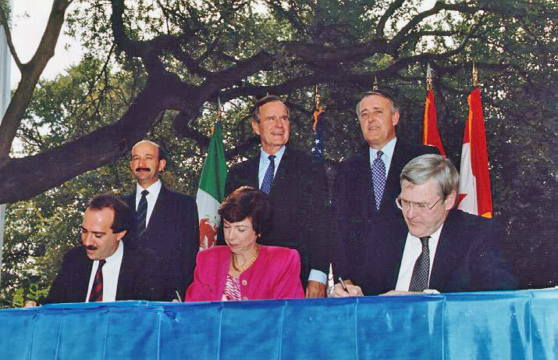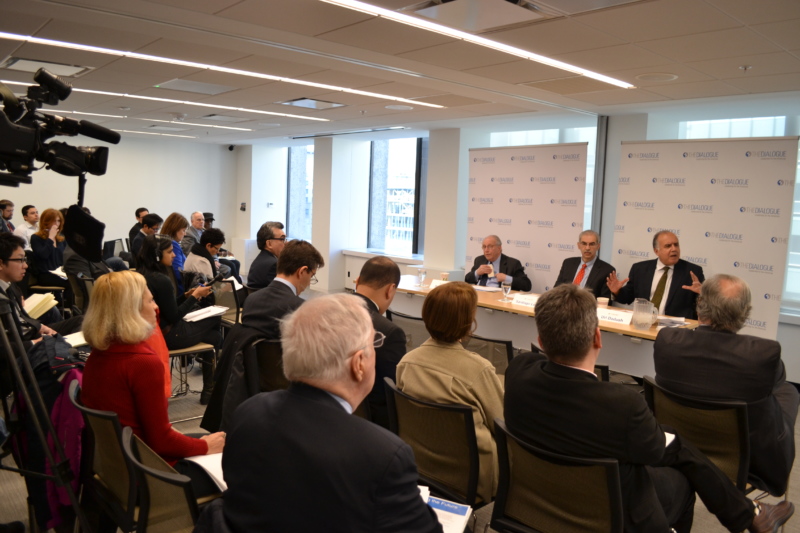
What are the Best Options for Modernizing NAFTA?
How significant of a priority should strengthening NAFTA be as compared to other trade agreements?
On March 6th, The Dialogue hosted an open discussion on the future of NAFTA and the global impacts of its potential reform or repeal. The event featured Uri Dadush, a Senior Fellow at the OCP Policy Center, discussing his working paper “NAFTA in Play: How President Trump could reshape trade in North America.” Afterwards, commentating on the working paper, Vice President for Sectors and Knowledge at the Inter-American Development Bank, Santiago Levy, gave his perspective on the future of the North American Free Trade Agreement.
Along with substantial political uncertainty about the future of the North American Free Trade Agreement (NAFTA), there is also widespread confusion about the various options and scenarios for reform within the complicated architecture of the multilateral trading system. Many of the possible outcomes would have grave implications—not only for the economies of Mexico, the US, and Canada, but also for other major trading partners.
It is inevitable that, if implemented, proposed border adjustment taxes will be challenged by the WTO
— The Dialogue (@The_Dialogue) March 6, 2017
- Uri Dadush #UntanglingNAFTA pic.twitter.com/E0pVAeastB
The relationship between the United States and Mexico is more uncertain than ever. A strained relationship between the United States and Mexico is concerning as the two countries look into reshaping their trade relationship. President Trump has repeatedly called NAFTA the worst trade deal ever, saying he believes it should be renegotiated or abandoned completely.
Although the outcome of NAFTA renegotiations is unknown, in his working paper Uri Dadush discussed plausible scenarios for what renegotiation could look like. The three plausible outcomes Dadush discussed were: a less liberal version of the current NAFTA, a complete breakdown of current negotiations, and the introduction of a border adjustment tax. Each of these scenarios holds different economic implications, but of the three Dadush finds the third possibility of border adjustment taxes to be the most worrisome. “It is inevitable that, if implemented, proposed border adjustment taxes will be challenged by the WTO” he said.
Santiago Levy structured his analysis by first discussing NAFTA from the perspective of Mexico, then from the perspective of the United States. The disappearance of NAFTA would likely mean a return to trade rules under the WTO, which would mean higher tariffs and likely disrupt the exchange rate. Both of these would be problematic for Mexican economic growth, as it would negatively affect Mexico’s most productive industries. Levy agreed with Dadush that the most concerning possibility is the implementation of a border adjustment tax. "The border tax adjustment scenario is not a US versus Mexico issue, it is a US versus world trade issue" said Levy.
The fate of NAFTA is concerning, but proposed U.S. tax reform is the primary source of uncertainty, says Santiago Levy #UntanglingNAFTA
— The Dialogue (@The_Dialogue) March 6, 2017
The speakers both emphasized the importance of the United States – Mexico trade relationship as being one of the most important in the world. During the Q&A period many other factors were discussed including exchange rates, China, and proposed US tax reform. The discussion provided a useful analysis of what potential renegotiations could yield, while still acknowledging potential uncertainty. As Dadush noted at the beginning of his presentation, "By now it's a cliche to say we don't know what's going to happen with Trump's policies."
Watch the full recording here:
How significant of a priority should strengthening NAFTA be as compared to other trade agreements?
The key to resolving Costa Rica’s fiscal deficit lies in a major reform that would replace the country’s sales tax with a value-added tax.
How will the change affect the countries’ trade relationship? What will be the economic impact in the United States and Mexico?
 Ben Raderstorf / The Inter-American Dialogue
Ben Raderstorf / The Inter-American Dialogue

